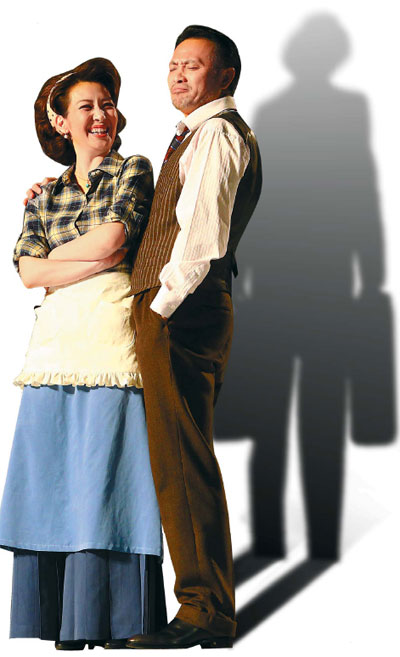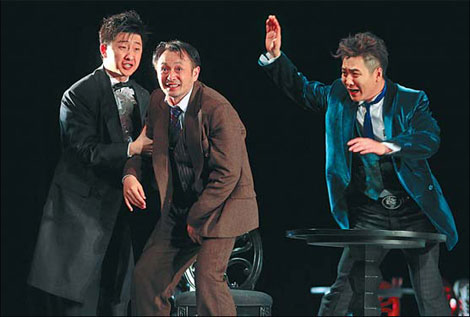Chinese theatergoers don't buy Salesman
 |
|
Willy Loman, played by Ding, and Linda Loman, played by Ai Fang, in Death of a Salesman. China Daily photo illustration |
 |
|
Willy Loman, played by Ding Zhicheng, and his two sons in Death of a Salesman, produced by the People's Art Theater. Photos Provided to China Daily |
|
?Related |
A new production of Arthur Miller's Death of a Salesman reveals as much about the changes in China as about what afflicts the American dream. Raymond Zhou reviews.
To watch an American classic on a Chinese stage is a study in cross-culturalism. And, in the case of Death of a Salesman, the comparison extends to economics, living standards and lifestyles. When Arthur Miller's masterpiece first came to China in 1983, the Chinese audience had never heard of "installment payments" or "life insurance". Nor had they seen a traveling salesman in at least 33 years. The idea that an ordinary citizen could own an automobile must have struck them as out of this world. As a matter of fact, that production, which ran for more than 50 shows to wide acclaim, was less about the American dream and its failings than about class struggle. Or, so it was perceived. Even in the eyes of the most informed at that time, the play could only have been construed as the underclass suffering from the oppression of the ruling class, an interpretation shaped by three decades of political indoctrination.
I don't know how Chinese audiences of the era made do with the fact that the Lomans own a house and a car. I figure it must have been downplayed or ignored.
When The Grapes of Wrath, the 1940 American movie about the truly downtrodden, applied for screening in the Soviet Union, the censors loved the theme of class struggle but struggled with the inconvenient detail that the American farmer in the film owns a truck, a priceless asset totally out of reach of ordinary Soviet citizens of the time. So, the film was banned.
I was still in graduate school in Guangdong's provincial capital Guangzhou when Death of a Salesman swept Beijing in 1983 and only read about it in the press.
But a video recording exists, and I browsed it for a comparison.
The first thing that hit me was how crummy Willy Loman's suit was.
In the early and mid-1980s, China was simply unable to produce a decent Western-style suit.
After three decades of treating it as a sign of Western decadence, the country had lost this simple sartorial craft - to the extent movies and stage plays of the era showed business executives of another country or another era wearing the kind of suits only migrant workers would wear today.
I had some firsthand experience in 1986, when I got my first chance to travel outside China and was given a special allowance to outfit myself.
Only one tailor store in Beijing could do it, and it was backlogged with orders from senior officials.
In a sense, the 1983 production, directed by Miller himself, served as a cautionary tale for a country on the verge of economic takeoff.
It warned people that you might not necessarily be happier when you have a choice of two kinds of cheese, American or Swiss, as Willy Loman did.
But this happened at a juncture when food rationing was just phasing out and nobody had ever tasted cheese (unless you lived on the Inner Mongolian grassland).
The play was way out of sync with Chinese sensibilities of the time. It was tantamount to telling a population that junk food is bad for one's health - a totally correct statement - when the audience has barely enough to eat.
Fast-forward 29 years.
China has a sizable and ever-growing middle class.
Salesmen knock on your doors, or worse, stop you wherever you are. However, owning property in Brooklyn is now the equivalent of a real-estate purchase along the Third Ring Road in Beijing in the 1990s, which means you end up in an envious position overall.
Even though the play is much closer to us today, China still has not reached what America was in the play.
China's middle class is relatively young and splurging on luxury merchandise.
The penny pinching practiced by Linda Loman is seen in China mainly among the urban poor or rural populations, which are still very large demographics.
Presenting an essentially middle-class quandary is like laughing in the face of all those who are fighting for a chance to squeeze into the middle class.
Had this been a Chinese play or film, it would sound like a bunch of spoiled brats whining about the travails of too many shopping trips to Dubai or Paris.
Director Li Liuyi does not help matters much by offering a mishmash of styles.
While the 1983 production attempted to recreate an American family circa 1949, the new production places the story in a world that can best be described as never here nor there.
All the allusions to Americana, including American football, are there, but the characters interact in an innately Chinese manner - not Chinese as you may encounter in real life, but Chinese as in bad soap operas.
The actors, while highly talented, do not even attempt to look or act their age.
Willy Loman is sporadically old, and Linda is at most 45 and glamorous enough to be someone's trophy wife.
The set is inconsistently abstract, with white balls of various sizes in the pit that stands for the garden. This goes with the cello solo, which seems to strip away the specifics of the time and the place, but the effect is destroyed with the onslaught of contemporary rock music and the blasting of Star-Spangled Banner at the climax of both acts.
The only good thing about this production by the People's Art Theater - arguably China's best playhouse of traditional drama and especially those of the Realism School - is the free flow of scenes of reality and fantasy.
But then, one can easily achieve this in a smaller venue with a minimal or no set.
A classic is for all times.

Even though its story does not sit well with Chinese society in terms of the developmental phase, Death of a Salesman is fundamentally about Willy Loman's psyche.
His illusion of making it big should resonate with us Chinese when we are bombarded by messages and recipes of turning our dreams into reality.
Had the Chinese production emphasized this crucial aspect of the play, those of us sitting in the theater may find a not-so-subtle parallel between Willy Loman's dilemma and the get-rich-quick mentality in our environment.


















